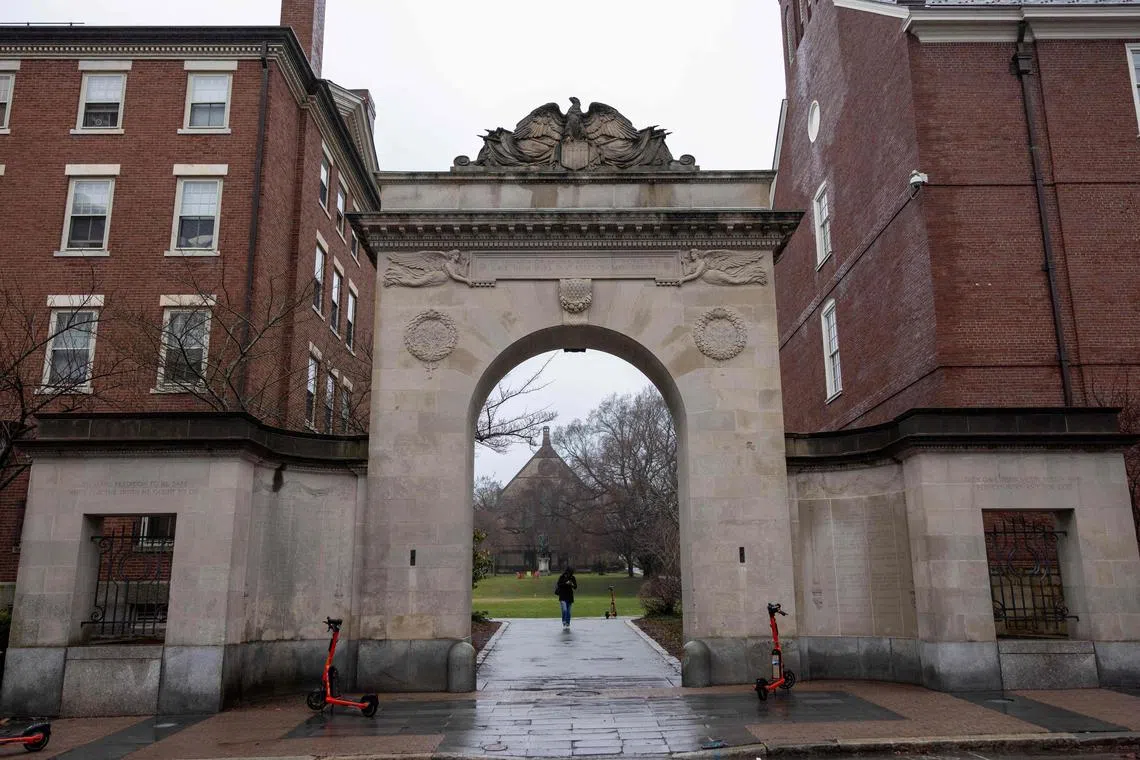Trump administration set to pause $680 million in contracts, grants for Brown University
Sign up now: Get ST's newsletters delivered to your inbox

Brown University became the fifth university known to face a potentially dire loss of federal funding.
PHOTO: AFP
NEW YORK - The Trump administration intends to block US$510 million (S$680 million) in federal contracts and grants for Brown University, expanding its campaign to hold universities accountable for what it says is relentless anti-semitism on campus, according to two White House officials familiar with the plans.
Brown became the fifth university known to face a potentially dire loss of federal funding, leaving other universities that the administration has targeted wondering when their turn might come.
If the administration pauses US$510 million, even over a period of years, the consequences for Brown could be significant. In its 2024 fiscal year, Brown received about US$184 million through federal grants and contracts.
In an e-mail to campus leaders on March 27, Brown’s provost, Frank Doyle, said the university was aware of “troubling rumours emerging about federal action on Brown research grants”” But he said that the university had “no information to substantiate any of these rumours”.
The Daily Caller was the first to report the pause.
Newly appointed Secretary of Education Linda McMahon has been explicit about the administration’s focus on elite universities, which Mr Trump has criticised as bastions of left-wing thought. She has said that taxpayer support is a “privilege” that can be withdrawn if universities do not adhere to civil rights law.
Like many of its Ivy League peers, Brown was the site of clashes over the war in the Gaza Strip. But it was also one of a small number of universities that made deals with students to end their protest encampments in the spring, agreements that came under criticism for being too soft on students.
Brown became one of only a handful of universities to agree to a board vote on divesting from Israel. The Brown Corp., the school’s governing board, ultimately voted against divestment, saying it held no direct investments in companies protesters had named as having ties to Israel.
After the Trump administration threatened to pull hundreds of millions of dollars in research grants and contracts from Columbia University and the University of Pennsylvania last month, Brown was one of the few universities that released a statement in response, saying that it would not compromise on academic freedom.
In the statement, Christina H. Paxson, the president of Brown, said that some of Mr Trump’s demands “raise new and previously unthinkable questions about the future of academic freedom and self-governance”.
She said if Brown’s essential academic and operational functions were threatened, the university “would be compelled to vigorously exercise our legal rights to defend these freedoms”.
Recently, Brown has also been considering whether to adopt a new policy that would limit statements issued by the university on political and social issues that are “unrelated to its mission”. It would join a number of other schools that have moved to adopt “neutrality” policies as they face pressure over their response to pro-Palestinian demonstrations.
Before the Trump administration targeted Princeton University for cuts on April 1, its president, Christopher L. Eisgruber, had also been vocal about the federal attack on colleges. He called the targeting of Columbia “the greatest threat to American universities since the Red Scare of the 1950s”.
The government’s campaign against specific universities began in February, when a new federal task force against anti-semitism issued a list of 10 universities that it planned to investigate. The administration cited claims that the schools may have failed to protect Jewish students and faculty members from discrimination during pro-Palestinian protests on campuses in 2023 and 2024.
The education department’s office for civil rights then expanded the list to 60 colleges, including both private and public universities.
Columbia became the first university affected when t he government cancelled US$400 million in federal funding review of roughly US$9 billion in federal grants and contracts to Harvard suspension of dozens of grants to Princeton.
In the following weeks, the Trump administration announced actions against three more universities. That included a pause of US$175 million in funding to the University of Pennsylvania; a
Universities have said the loss of funding would compromise the United States’ leadership in scientific, medical and technological research. NYTIMES


